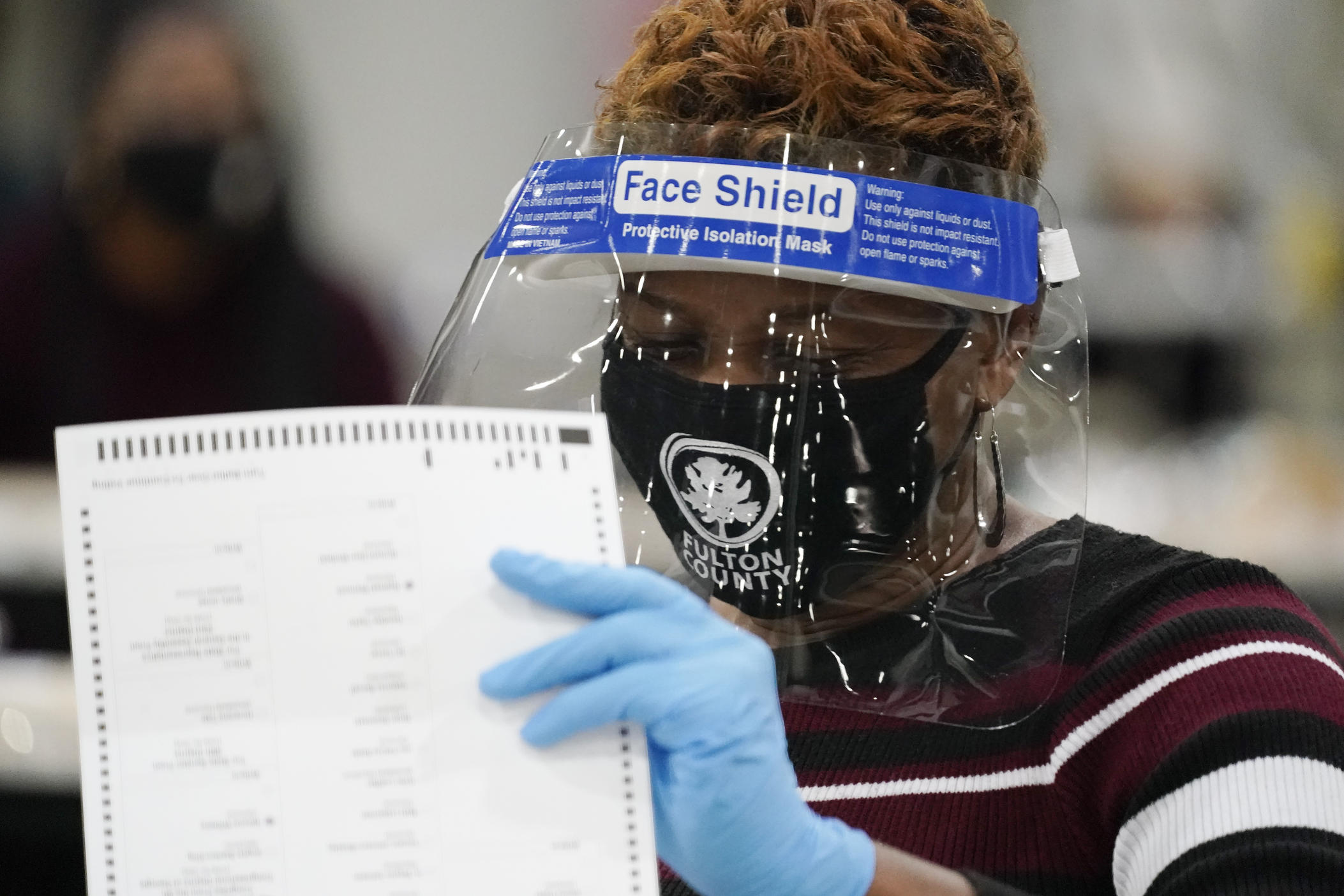Section Branding
Header Content
Battleground: Ballot Box | Why Georgia's Audit Is Re-Counting 5 Million Ballots By Hand
Primary Content
This episode of Battleground: Ballot Box asks the question: Why have thousands of workers across the state been hand counting nearly five million pieces of paper for several days? And why might they have to do something similar again soon?
On Monday, Nov. 9, Republican U.S. Sens. Kelly Loeffler and David Perdue called on Georgia Secretary of State Brad Raffensperger to resign from office.
On Tuesday, Nov. 10, the chair of the Georgia Republican Party and Rep. Doug Collins, acting on behalf of the Trump campaign, sent a letter demanding a hand recount and that officials review absentee ballot signatures that they believed would show improper votes.
Since the Nov. 3 election two weeks ago, Republican leaders in Georgia have, without evidence, claimed that “millions of Georgians doubt the process for counting ballots in this state” and argued that the most transparent election in Georgia’s recent history was not, in fact, clear-cut.
Through the controversy, the state’s top election official declined to cave to the partisan pressure. That’s why it was somewhat surprising to hear Raffensperger announce Wednesday, Nov. 11, that the risk-limiting audit required by law would look at the presidential race, and it would require hand recounting of nearly 5 million ballots in just six days.
“This will help build confidence,” Raffensperger said. “It will be an audit, a recount, and a recanvass all at once. It will be a heavy lift. But we will work with the counties to get this done in time for our state certification.”
However, the process that has taken place across Georgia over the last several days has not been an audit, or a recount, or a recanvass, per se. Rather, it is a hybridization of several procedures meant to assure voters that the outcomes are correct — and perhaps assuage an un-assuageable Republican base that is still being told that President Donald Trump will have a second term.
Georgia has instituted a new voting system that uses ballot-marking devices. This system utilizes touchscreen voting machines that print your selections on a piece of paper along with a QR code that is then scanned and stored. So state officials say Georgia can audit those votes to ensure things are as they should be.
“Because we now have that verifiable paper ballot, for the first time in 18 years, we're gonna have something to count. So instead of just pressing a button and getting the same answer,” Raffensperger said, “we'll be counting every single piece of paper, every single ballot and every single lawfully cast legal ballot.”
A new Georgia law requires a statistical procedure known as a risk-limiting audit, or RLA. Back in June, a small audience gathered in a nondescript warehouse just outside midtown Atlanta to watch a pilot RLA and learn how they work.
“It's a type of audit that can help assure us that the tabulation equipment gave us the right outcome for the election, meaning that the right winner won,” said Monica Childers, a product manager at the nonprofit VotingWorks. VotingWorks was hired by Georgia and other states to help design and develop the RLA process.
The audit depends on the margin between the winner and the loser. The larger the margin, the fewer the number of ballots needed to satisfactorily determine who won. Tight margins could result in a hand recount. For example, in the June primary Joe Biden overwhelmingly won Fulton County, securing nearly 82% of the vote. The RLA software said it should only take 27 ballots to ensure 90% confidence in the election results being correct. This doesn’t dissect the precise margin, but simply establishes who won.
After determining the number of ballots needed, auditors roll 20 10-sided dice, Dungeons-and-Dragons style, to create a random number that seeds the auditing software’s random number algorithm.
Workers then consult a manifest of every single ballot cast. Ballots are sorted by method, separated into absentee, early-in-person and Election Day batches. They identify which specific ballots to pull, and manually examine the choices. It’s a smooth, transparent process with a big paper trail that’s meant to be much less time-consuming than other methods to verify elections.
In that Fulton County warehouse, once those ballots were found, manually examined, and tallied, the RLA software said there was less than a 1% chance that Joe Biden did not win the Democratic primary.
But in the general election, Joe Biden beat Donald Trump by only 0.3%. Because of the tight margin, the number of ballots needed for the RLA to hit the target confidence would be more than one and a half million. According to elections officials and experts, at this point it is easier to carry out a full hand recount.
Gabriel Sterling with the Secretary of State’s office said that it is paramount for voters to believe in the outcome of the presidential race that Trump and other top Republicans refuse to acknowledge.
“If it was 14,000 votes the other way, we would be doing the exact same thing,” Sterling said. “This is very important to understand because right now there’s a swath of voters in the state and around the country that’ll say ‘Those machines cheated, those machines miscounted, somebody hacked them.’”
At county supervisor training on Thursday, 159 people were briefed on how they were supposed to count through five million ballots in less than a week. In pairs, each audit team read off the names of candidates and placed them in stacks, with each batch carefully logged and counted to guarantee accuracy.
The key to this process is transparency. The public, partisan observers and the press have been watching, several counties have even live streamed the process, and a paper trail documents every single step in the process. Additionally, security of the chain of custody ensures that every ballot is counted properly.
“We're talking about security before the audit begins. We're talking about security during breaks. We're talking about security in the evenings or when nobody's there,” Georgia State Election Director Chris Harvey said.
As of the taping of this episode, things were running smoothly and meeting the Wednesday 11:59 p.m. deadline looked feasible. Small counties such as Bacon County finished the same day they started — on Friday — with the starting and ending counts staying the same. Medium-sized counties such as Athens-Clarke have dedicated enough time and staff to avoid working long hours every day. In the largest counties, extra resources made for quick work; Fulton County knocked out more than half a million ballots over the weekend with no issue.
As Georgia’s 159 counties finish up the totals, we will expect to see a slight difference in the totals from the original certified results, because there are humans involved in the counting process, even working in pairs. But these discrepancies should not be enough to change the outcome of the presidential race.
But that may not end Georgia’s vote-counting saga.
This audit happens before the state certifies results. As we’ve heard, it’s not a typical RLA but it’s not a fully-fledged recount either. A recount could still come. By Georgia law, if the loser is within 0.5% of the winner, he or she can request that all 5 million ballots be re-run through high speed scanners to check the results. Remember, President Trump is at about 0.3%.
That could happen next week if the Trump campaign requests it, but state officials hope this Herculean hand count will satisfy their questions. However, based on continued attacks from President Trump and the chair of the Republican Party of Georgia, that seems unlikely.
Battleground: Ballot Box is a production of Georgia Public Broadcasting. You can subscribe to our show at gpb.org/battleground, or anywhere you get podcasts.
Please leave us a rating and review on Apple Podcasts. Our editor is Wayne Drash. Our intern is Eva Rothenberg, the show is mixed by Jesse Nighswonger and the director of podcasting is Sean Powers.



